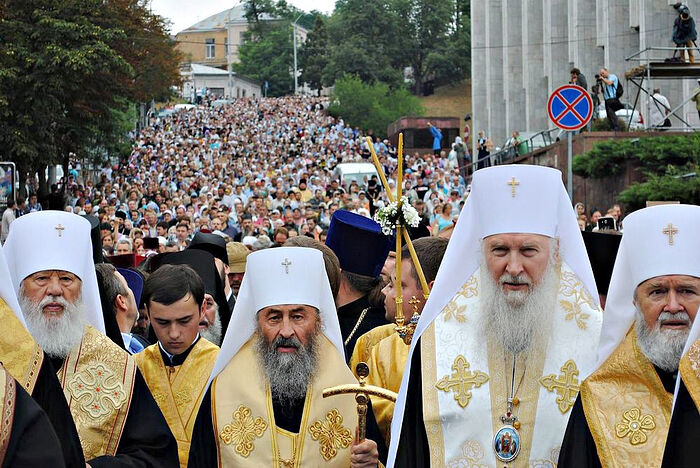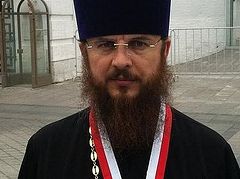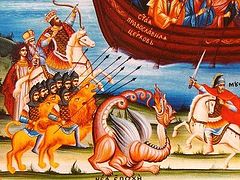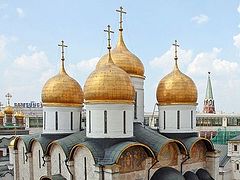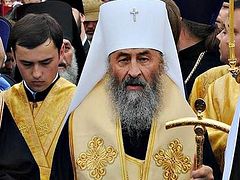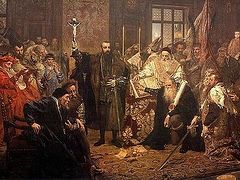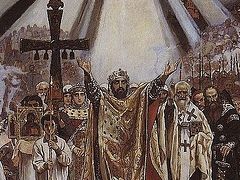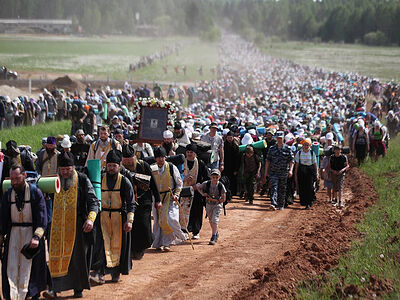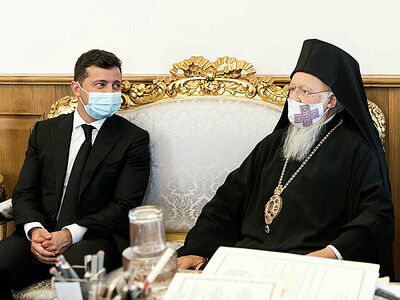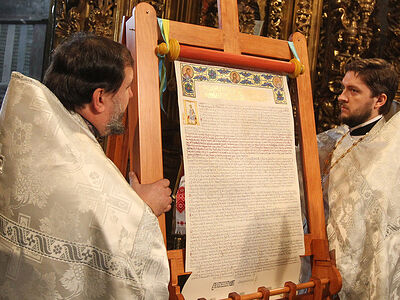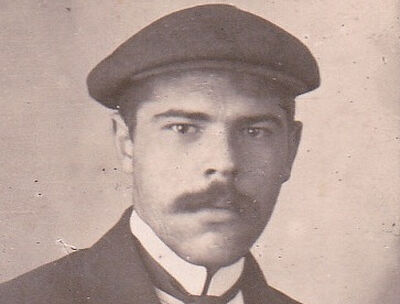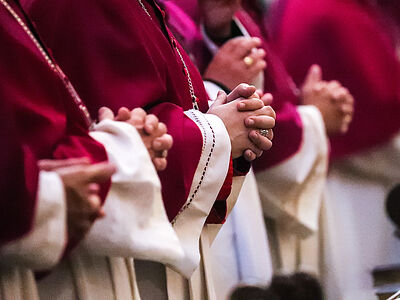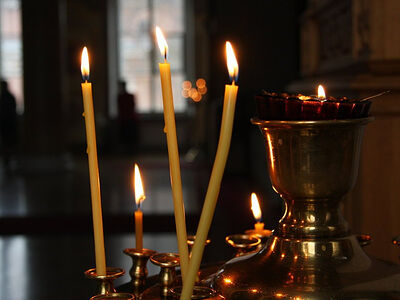“THE STRENGTH OF UKRAINE IS IN ITS ORTHODOX FAITH”
A Talk with Abbess Seraphima (Shevchik) for the 30th Anniversary of the Ukrainian Orthodox Church
2020 is a jubilee year for the Ukrainian Orthodox Church: Thirty years ago, in late October 1990, Patriarch Alexiy II signed a gramota granting the Ukrainian Orthodox Church independent status with broad rights of autonomy. Since then, the canonical Church in Ukraine has faced all sorts of trials, including a bloody schism and open persecution from the powers that be.
Our conversation with Abbess Seraphim (Shevchik), a member of the Inter-Council Presence of the Russian Orthodox Church and head of the Ukrainian Church’s Synodal Church and Culture Department, concerns this difficult, sometimes dramatic period. Mother Seraphima is the author of more than twenty books and monographs dedicated to the life of the UOC and the history of Orthodoxy in Ukraine, the organizer and director of the Orthodox Ukraine and Christian Odessa museums, and numerous exhibitions and conferences, the latest of which was dedicated to the thirtieth anniversary of the Ukrainian Orthodox Church.
Thirty years ago…
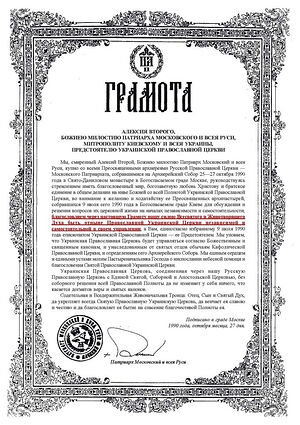 The gramota of His Holiness Patriarch Alexiy II granting independent governance to the Ukrainian Orthodox ChurchBefore our conversation with Matushka Seraphima, we would like to remind our dear readers of some historical and political fragments of that distant period that preceded Patriarch Alexiy II’s granting of the gramota, or as it is called now, the tomos, granting independence and self-governance to the UOC.
The gramota of His Holiness Patriarch Alexiy II granting independent governance to the Ukrainian Orthodox ChurchBefore our conversation with Matushka Seraphima, we would like to remind our dear readers of some historical and political fragments of that distant period that preceded Patriarch Alexiy II’s granting of the gramota, or as it is called now, the tomos, granting independence and self-governance to the UOC.
In late 1989, after Mikhail Gorbachev’s visit to the Vatican at the request of Pope John Paul II (1978-2005), the first Polish-born pontiff, the Ukrainian Greek Catholic church, which cooperated with the German occupiers during the war and ceased to exist in the USSR in 1946, was reanimated. A wave of seizures of Orthodox churches and cathedrals swept throughout western Ukraine; Orthodox clergy and their families were driven out of Church rectories onto the streets and were subject to violence and persecution.
In February 1990, Archbishop Makary (Svistun; † 2007) of Ivano-Frankivsk locked himself up in Holy Resurrection Cathedral in protest of the raiding by the Greek Catholics and declared an indefinite hunger strike, which caused a mixed reaction in the Council for Religious Affairs of the USSR—Vladyka was removed from the cathedra by decree of Philaret Denisenko, at that time a lawful hierarch of the UOC.
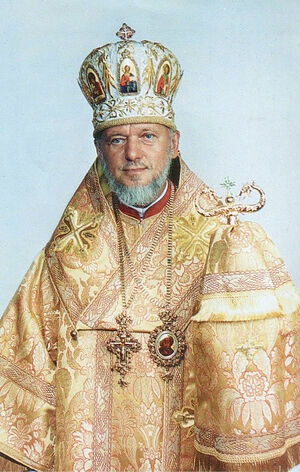 Metropolitan Makary (Svistun)Also in 1989, the Council for Religious Affairs of the USSR registered the “Ukrainian Autocephalous Church of the Kiev Patriarchate,” which emerged in Ukraine in the early twentieth century, born in the scum of the revolutionary upheavals of 1919-20 and popularly known as the “self-consecrators—Lipkivskyites” (after the name of the leader of the Ukrainian schism Vasily LIpkivsky)—supported by the Bolsheviks to weaken the Russian Orthodox Church in Ukraine, and which ceased to exist in the USSR in 1937.
Metropolitan Makary (Svistun)Also in 1989, the Council for Religious Affairs of the USSR registered the “Ukrainian Autocephalous Church of the Kiev Patriarchate,” which emerged in Ukraine in the early twentieth century, born in the scum of the revolutionary upheavals of 1919-20 and popularly known as the “self-consecrators—Lipkivskyites” (after the name of the leader of the Ukrainian schism Vasily LIpkivsky)—supported by the Bolsheviks to weaken the Russian Orthodox Church in Ukraine, and which ceased to exist in the USSR in 1937.
Among the activists of the Ukrainian schismatics was the future “Patriarch” of the UAOC Mstislav (Skrypnyk, 1898-1993), then still the layman Stepan Ivanovich Skrypnyk who was the nephew of Simon Petliura and served in the latter’s Ukrainian National Republic troops as a personal adjutant, who was “ordained” in 1942 during the nazi occupation, and fled to Canada and American after the war.
On June 5, 1990, at the 1st Council of the UAOC in Kiev, Mstislav was elected the “Patriarch of Kiev and All Ukraine,” and in October of the same year, he returned to Ukraine and visited Kiev and Lvov. On November 18, 1990, with the kind permission of the authorities, he was “enthroned” in St. Sophia Cathedral in Kiev. Mstislav became the first “Patriarch of the UAOC.” After the fall of the USSR in 1991, he arrived in Kiev from the U.S. again in July 1992, and by order of the first president of Ukraine, he was generously provided with the former sanatorium of the Central Committee of the Communist Party of Ukraine in Puscha-Voditsa, near Kiev, where Mstislav met with Ukrainian President Leonid Kravchuk on July 2.
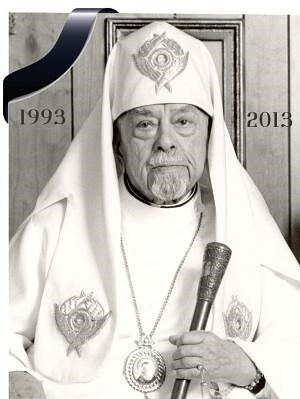 Mstislav SkripnikAdditionally, public national-patriotic movements became active in Ukraine, the radical representatives of which waged an open campaign against the Ukrainian Exarchate of the ROC, and after the exarchate was granted independence—against the canonical Ukrainian Orthodox Church.
Mstislav SkripnikAdditionally, public national-patriotic movements became active in Ukraine, the radical representatives of which waged an open campaign against the Ukrainian Exarchate of the ROC, and after the exarchate was granted independence—against the canonical Ukrainian Orthodox Church.
In 1992, Ukrainian Orthodoxy suffered a new calamity in the person of the schismatic Philaret Denisenko, a formerly lawful hierarch who was the exarch of the Ukrainian Exarchate of the ROC for many years. Accepting the gramota of independence and self-governance from the hand of His Holiness Patriarch Alexiy II, Philaret hoped to achieve full autocephaly in the future, with the title of “Patriarch of All Ukraine.”
Fulfilling the duties of Locum Tenens after the death of Patriarch Pimen († 5/30/1990), he could not bear defeat in the election of the Patriarch of Moscow and All Russia at the Local Council of the ROC in June 1990. The author of these lines, then working in the Metropolia of the UOC as editor of an Orthodox newspaper, witnessed how the klobuk of the Patriarch of Moscow was sewn for Philaret and how containers full of his things were prepared for moving to Moscow. But the future schismatic suffered a crushing defeat in the Patriarchal election, receiving only 66 votes in the election held at Danilov Monastery in Moscow, against 139 for the future Patriarch Alexiy (Ridiger), and 107 for Metropolitan Vladimir (Sabodan), the future primate of the Ukrainian Orthodox Church.
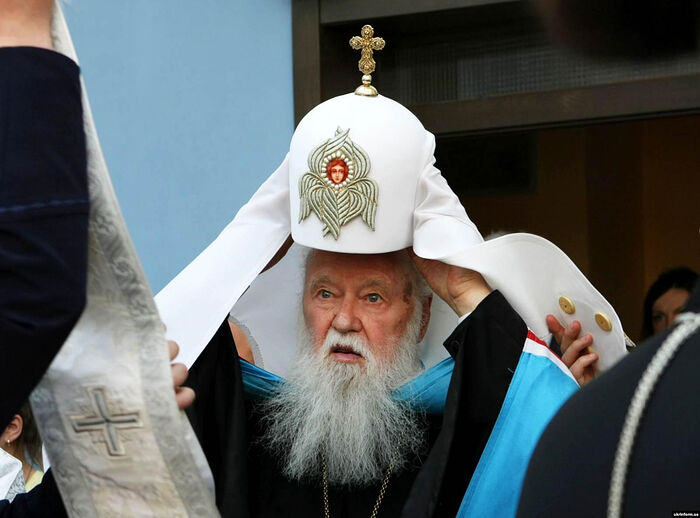 Leader of the Ukrainian schismatics, the former Metropolitan Philaret Denisenko
Leader of the Ukrainian schismatics, the former Metropolitan Philaret Denisenko
As we can see, even on the eve of gaining independence and self-governance, and in the subsequent period of its activity, the Ukrainian Orthodox Church has born the cross of great trials.
“The people of God united around their hierarchs”
We found Mother Seraphima in her office at the Odessa Archangel Michael Convent, which she has led for twenty-five years now.
She was negotiating the selection of exhibits for the next exhibition just then. Having finished her conversation, despite being so busy, she kindly agreed to speak with some Kiev journalists.
***
 Despite being so busy, Mother kindly answered our questions
Despite being so busy, Mother kindly answered our questions
—Mother Seraphima, recalling the events of thirty years ago, tell us: How do you think the Ukrainian Orthodox Church today evaluates its reception of independence in 1990? After all, you were a novice at the famous Kiev Holy Protection Convent then, founded by St. Anastasia—the Grand Duchess Alexandra Petrovna Romanov, and which was among the monasteries of Ukraine that protested against the dictatorship of Philaret.
—All of us, the children of the Ukrainian Orthodox Church, are clearly convinced today of how right a step it was for the Holy Synod of the ROC and His Holiness Patriarch Alexiy II to grant the UOC the status of independence and self-governance in 1990. We can confidently say now that this historical act took place by the ineffable providence of God; that is, the Ukrainian Orthodox Church has taken its rightful place in the Orthodox world and is truly autonomous, independent, self-governing, and unique in its structure. I think not even all the Local Churches that were granted autocephaly by Constantinople possess the same scope of rights as the UOC.
—But now we have a new trial: the interference of the Patriarch of Constantinople in the life of the UOC—a new schism, now with the participation of the hierarchs of Istanbul.
—These non-canonical and immoral actions of Constantinople have caused pain in the family of the Orthodox Churches. As you know, many of them have showed unanimity with our Ukrainian Orthodox Church. They recognize His Beatitude Metropolitan Onuphry as the sole lawful primate of the UOC and the majority are opposed to the politics of Istanbul.
—Matushka, let’s go back to the swashbuckling 1990s.
—Yes… Our Church received an impetus towards independent development, but from the very first days of the early 1990s, it found itself in the extremely difficult conditions of all kinds of provocations from the former Metropolitan Philaret and from the authorities, who strongly supported the schismatics.
Philaret wanted to become Patriarch of Ukraine any way he could, and he went to every length to achieve his goal: He deposed dissenting bishops and committed many unseemly deeds. But the healthy forces of the Church united and cured this disease. This is the value of the process of Church recovery and self-purification.
Despite internal vicissitudes, the actions of schismatics, and political attacks, life itself has testified that the canonical Church has a healthy core that the gates of hell cannot overcome (cf. Mt. 16:18). The people of God are united around their hierarchs, including Metropolitan Onuphry, Vladyka Agafangel, Vladyka Alypy, and others. An historical Bishops’ Council of the UOC was held in Kharkov in May 1992, which gave a canonical evaluation of Philaret’s actions, elected a new legitimate primate—His Beatitude Metropolitan Vladimir (Sabodan, † 7/05/2014), and placed a limit on the Church turmoil and unrest. In fact, the Church had reached a new historical milestone, passing through the fiery trial of schism and persecution.
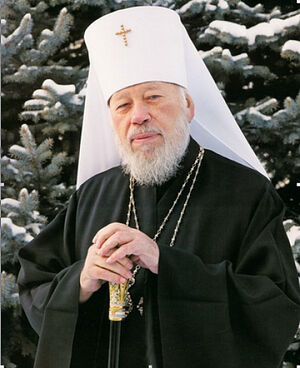 His Beatitude Metropolitan Vladimir (Sabodan) led the Ukrainian Orthodox Church from 1992 to 2014—However, the Verkhovna Rada [Parliament] issued a resolution on the illegality of the Kharkov Council, so the authorities at that time supported Philaret. Even the Bolsheviks didn’t do that. You had your obedience then in Holy Protection Monastery and witnessed these events. As far as we know, not a single monastery in Ukraine supported the schism. Do you remember how the sisters and you personally reacted?
His Beatitude Metropolitan Vladimir (Sabodan) led the Ukrainian Orthodox Church from 1992 to 2014—However, the Verkhovna Rada [Parliament] issued a resolution on the illegality of the Kharkov Council, so the authorities at that time supported Philaret. Even the Bolsheviks didn’t do that. You had your obedience then in Holy Protection Monastery and witnessed these events. As far as we know, not a single monastery in Ukraine supported the schism. Do you remember how the sisters and you personally reacted?
—Monasticism showed its strength then and gave a weighty word. For example, the monks of Holy Dormition Monastery in Odessa sent a letter to His Holiness Patriarch Alexiy II in which they categorically rejected Philaret’s idea of autocephaly and expressed unity with the Moscow Patriarchate. Other monasteries did the same, unanimously expressing unity with the Mother Church.
If we recall Holy Protection Monastery at that time, Matushka Margarita (Zyukina, † 2005)—her memorial falls right on November 10—our blessed eldress and abbess, was very worried and increased her prayers together with all the sisters. This conciliar prayer of the monastics, bishops, and laity gave a way out of the intolerable situation created in the Church by Philaret’s ambitions and authoritarian actions.
And when Metropolitan Vladimir arrived in Ukraine, I think you could say it was a national assembly: Representatives from every diocese in Ukraine and a crowd of thousands of lay people came to meet Vladyka, blocking all the streets by the station; and there was a grand procession from the station to the Lavra. Then the primates of every, I emphasize every, Local Church in the world sent written greetings to the newly-elected primate of the UOC Metropolitan Vladimir, thereby confirming that world Orthodoxy recognizes only our Church as lawful in Ukraine, as part of the Russian Orthodox Mother Church.
—The Church has endured and still endures great trials coming from the political elite of the country, various parties, and radical nationalist forces’ interference in its life.
—Absolutely true. Let’s recall at least 2008, when President Viktor Yushchenko invited Patriarch Bartholomew to Ukraine without informing Metropolitan Vladimir. And he came, knowing that it violates the canons of the Church, which state that a hierarch of any Church cannot visit the territory of another Church without an invitation [from the local first hierarch]. But Patriarch Bartholomew came to Ukraine anyways, positioning himself as the rightful hierarch of this land, and he met with President Yushchenko. He received attention at the highest level of government. Already then, without the participation of the UOC, the presidential administration was holding separate negotiations on autocephaly, about giving the “Kiev Patriarchate” the status of legality, of creating an Istanbul dependency in Kiev, and so on. Oh, but what a reaction from the faithful to the visit of the guest from Istanbul!...
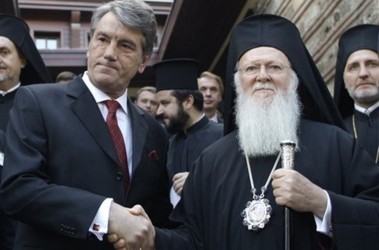 Viktor Yushchenko welcomes Patriarch Bartholomew, 2008
Viktor Yushchenko welcomes Patriarch Bartholomew, 2008
Patriarch Bartholomew and Patriarch Alexiy met on Vladimir Hill on the day of 1,020th anniversary of the Baptism of Rus’. The people of God, who crowded the slopes of the park around the hill, received the guest from Constantinople coldly, but joyfully applauded His Holiness [Patriarch Alexiy]. I was standing not far away and could see how Patriarch Bartholomew bowed his head low and was looking at the ground. And when the people started chanting: “Our Patriarch is Alexiy!” he winced, lowered his head, and hunched his shoulders. Then the state project failed. Yushchenko himself left the Divine Liturgy after the first exclamation, so affected was he by the shouts of the people and the absolutely clear expression of the position of the many thousands of the flock of Ukrainian Orthodoxy. Yushchenko was as if carried away from the square…
And one other detail: Our Church didn’t participate when the protocol for Patriarch Bartholomew to serve in St. Sophia Cathedral for the 1,020th anniversary of the Baptism of Kievan Rus’ was drawn up, by no fault of our own—we were simply cut out, and Yushchenko demanded that Philaret serve with Bartholomew. But Bartholomew was forced to reject this scenario, shamefacedly explaining to Yushchenko that the schismatic Philaret had no right to serve with him. So Yushchenko asked that Philaret at least be allowed to stand nearby and pray, either in the altar, or at least in the church. This was also refused. Bartholomew understood then that this step could mean his condemnation by the whole of world Orthodoxy. So the service in St. Sophia was held without the head of the “Kiev Patriarchate,” but with His Beatitude Metropolitan Vladimir. On July 27, 2008, there was a service on Vladimir Hill, with the participation of Patriarch Alexiy II, Patriarch Bartholomew, His Beatitude Metropolitan Vladimir, and the primates and representatives of all the Orthodox Churches of the world. The Lord did not allow the schismatics to participate.
Part 2. Which is Our True Mother Church, and Who is our True Father?
11/16/2020
- Ukrainian Church Crisis
- The Ukrainian Orthodox Church: Which is Our True Mother Church, and Who is our True Father?Deacon Sergei Geruk
- The End of the CalmAlexander Koval
- “You Support Blasphemers Dressed Up in Priestly Vestments”
- The “Tomosology” of the Patriarchate of Constantinople. Part 3Pavel Darovsky
NEW MATERIAL
- The DecievedTo the 100-year anniversary of the Russian Exodus
- The Ukrainian Orthodox Church: Which is Our True Mother Church, and Who is our True Father?Deacon Sergei Geruk
- On Returning to Catholics the Faith of Their AncestorsPavel Darovsky
- The TempleArchpriest Andrei Tkachev
- We Can’t Kill Ourselves in Order to Avoid PainAn answer to a girl who was a step away from suicide


